Judge Priest (1934) and Community
18/07/2024
- Boomlight
18/07/2024
- Boomlight
In Judge Priest (1934), Ford renders a post-bellum southern community in its entirety. Through the titular character, Judge Priest, he examines the town’s morals, beauties, and most of all, its hypocrisies. Ford begins the film by giving Judge Priest his role of power within the community. As soon as the film opens Judge Priest is seen. “Here, here, the court’s been called to order,” he says. Before the viewer is introduced to the fictional community, Judge Priest is posited as The Law. The moral figure that presides over the town and leads it in his ideal way. The idea of Priest as the town’s moral figure of tolerance is repeated through the film’s opening text.

With Ford’s use of Priest’s leadership, he manages to make a film that reveals contradictions within the town and Judge Priest himself. The film itself is made up of many duets (whether that be of people singing or talking) that play between harmony and dissent. This modulation leads to a musicality in the structure.
After Ford introduces Priest, the credits appear with images of the community. The track “My Old Kentucky Home” plays. This track, written by Stephen Foster in 1853, nostalgically recollects the Old South. Notably, Foster’s original lyrics for the track detail the despair of an enslaved person and their desire to return home. The differences between the original and current lyrics of “My Old Kentucky Home” closely parallel the contradictions presented in Judge Priest. On one hand the film is a sentimental and tragic film that laments the tragedy of the Old South; however, on the other hand, it is a film that examines Southern ideals with great contempt, and recognizes how they stand in the way of tolerance.
In Judge Priest, the townspeople are unable to move on from confederate honor and tradition. One scene shows a man feverishly polishing his gun, still attached to wartime tradition. Judge Priest’s character is commonly used to reveal the intolerance that stems from said townspeople’s adherence to tradition/honor. In a scene where Judge Priest is talking with Caroline about Rome, Priest rejects Caroline’s disapproval of Rome’s relationship with Ellie May. Caroline’s familial pride which makes her disapprove of this relationship gives way to Caroline seeing Ellie May as lesser than herself.
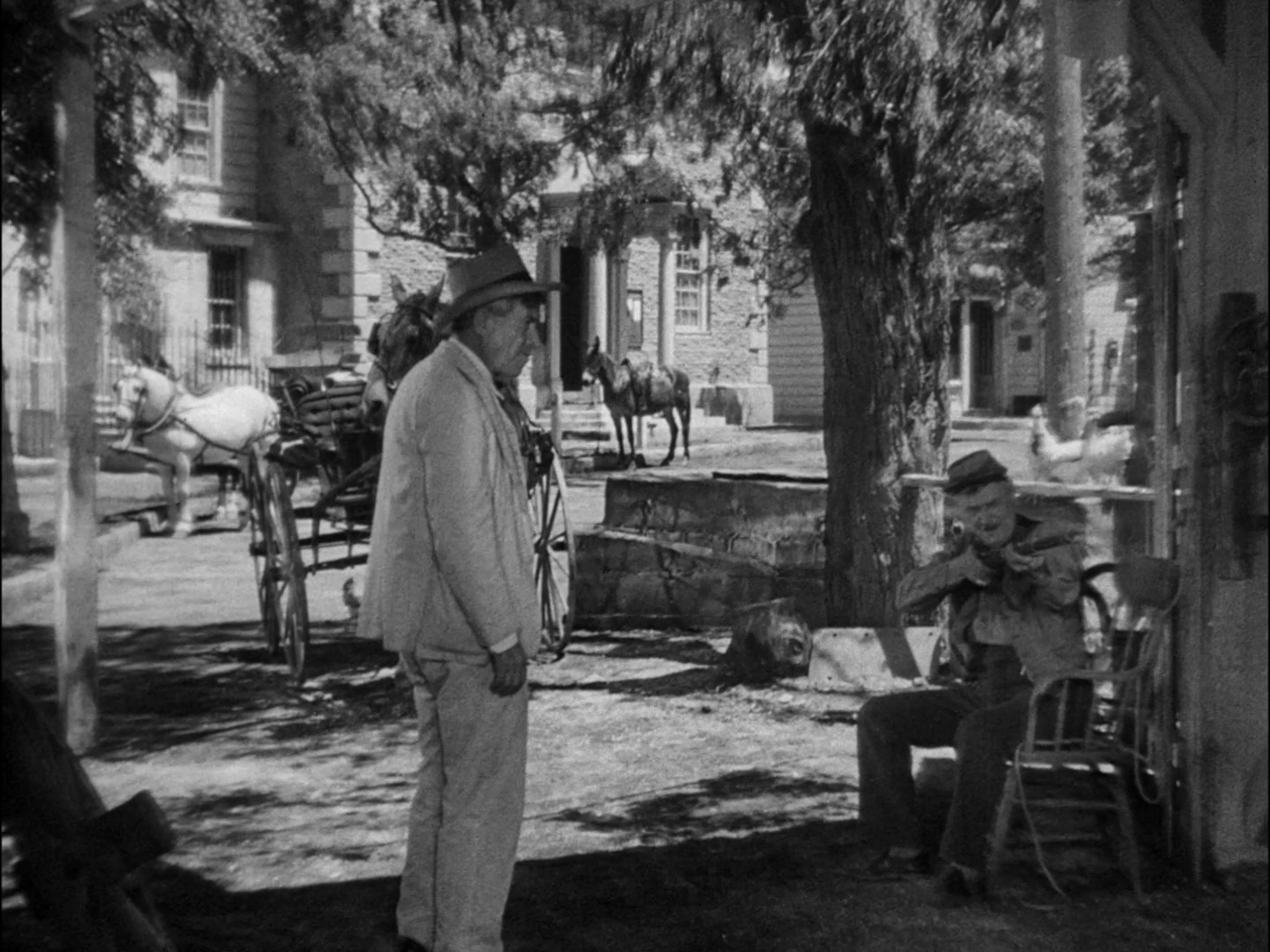
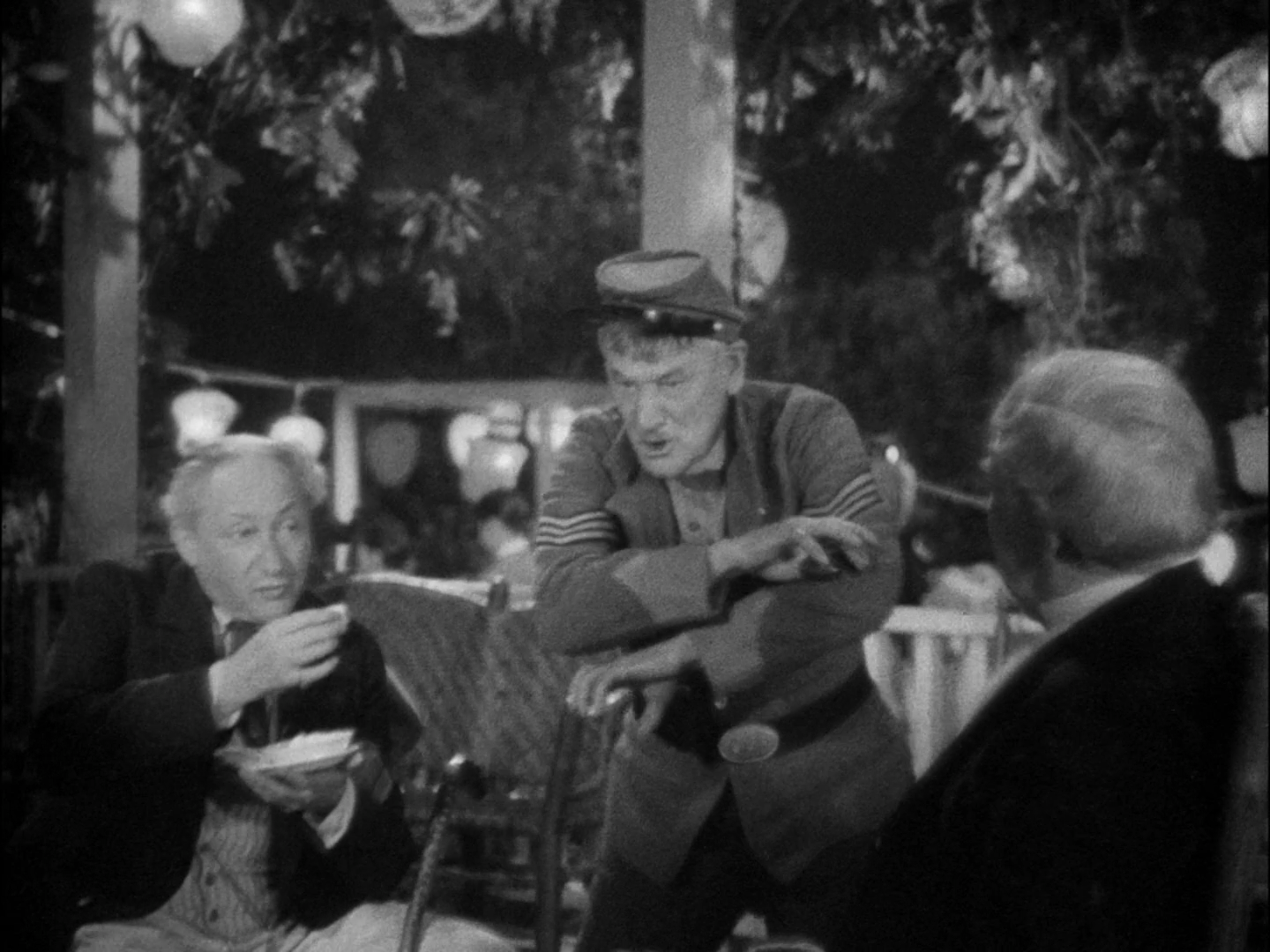
Even though Judge Priest at times acts in favor of tolerance, and by doing so reveals the townspeople’s intolerance, his character is equally flawed, if not more so. His flaws are revealed through contradictions, every tolerant act is backed by one of intolerance. One of the earliest examples of this is in the opening courthouse scene where Jeff is on trial for theft. In this scene Judge Priest is seen reading cartoons from the newspaper. Once he looks away from the newspaper, he sees Jeff sleeping and says, “Hey Boy, wake up, if anybody’s going to be sleeping in this court, it’ll be me.” Priest feels entitled from his power as judge, and this entitlement breeds intolerance.
In the first still Judge Priest is shown above Jeff, he speaks condescendingly to him, abusing his power; however, as the scene fades, Judge Priest is seen on Jeff’s level. They talk as equals.

Judge Priest ultimately sees himself as a leader of tolerance. This self righteousness + his social role as Judge gives him power. This power is an abusive power, a power that creates room for intolerance. This power reveals the cracks in Priest’s supposed “tolerance.”
These two stills show another example of the film's play between harmony and dissent. They also show an example of Priest’s faux-tolerance. Rome and Dilsey talk on the same ground, as equals. The next frame shows Priest, the supposedly tolerant figure of the community, abusing his power by using Jeff to fetch croquet balls. Sure, Priest can be tolerant at times, but it’s a tolerance that sees others as lesser than him. In his mind he is ultimately the greater person, and his tolerance is birthed from self righteousness. He tells Rome, “I got Jeff here. He’s doin the retrievin’ for me.” As he looks down and points, treating Jeff almost like a dog.
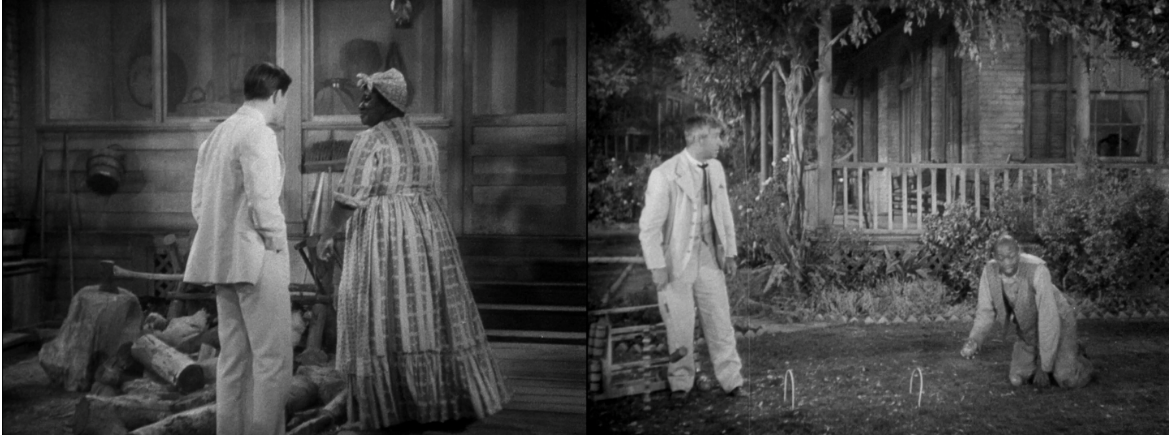
Judge Priest heavily values material wealth. During the scene in which Jeff is retrieving croquet balls for Priest, Jeff sees a goat. Despite his constant mention of this goat, Priest pays no mind to Jeff (paying more attention to Rome and Ellie May). When Priest does finally listen to Jeff it is because Jeff says, “That Goat is in your mint bed!” It is only when Priest’s material possessions are threatened that he listens to Jeff. In another scene Jeff is seen wearing a coat and vest of Priest’s. Priest angrily approaches Jeff, exclaiming, “I thought I told you to stay away from that vest!” When his material possessions are threatened he forgoes his tolerance and acts angrily.
Priest’s self-righteousness and power ultimately derives from his celibacy. His wife is dead and he constantly laments his loneliness. He fills his life with power rather than companionship. He sees himself in Rome and that is why he tries to bring him and Ellie May together..
In this scene, Priest is barred from Rome. Although he identifies with him, he can never enter Rome’s world. Rome is also barred off from Ellie May’s world here, however…
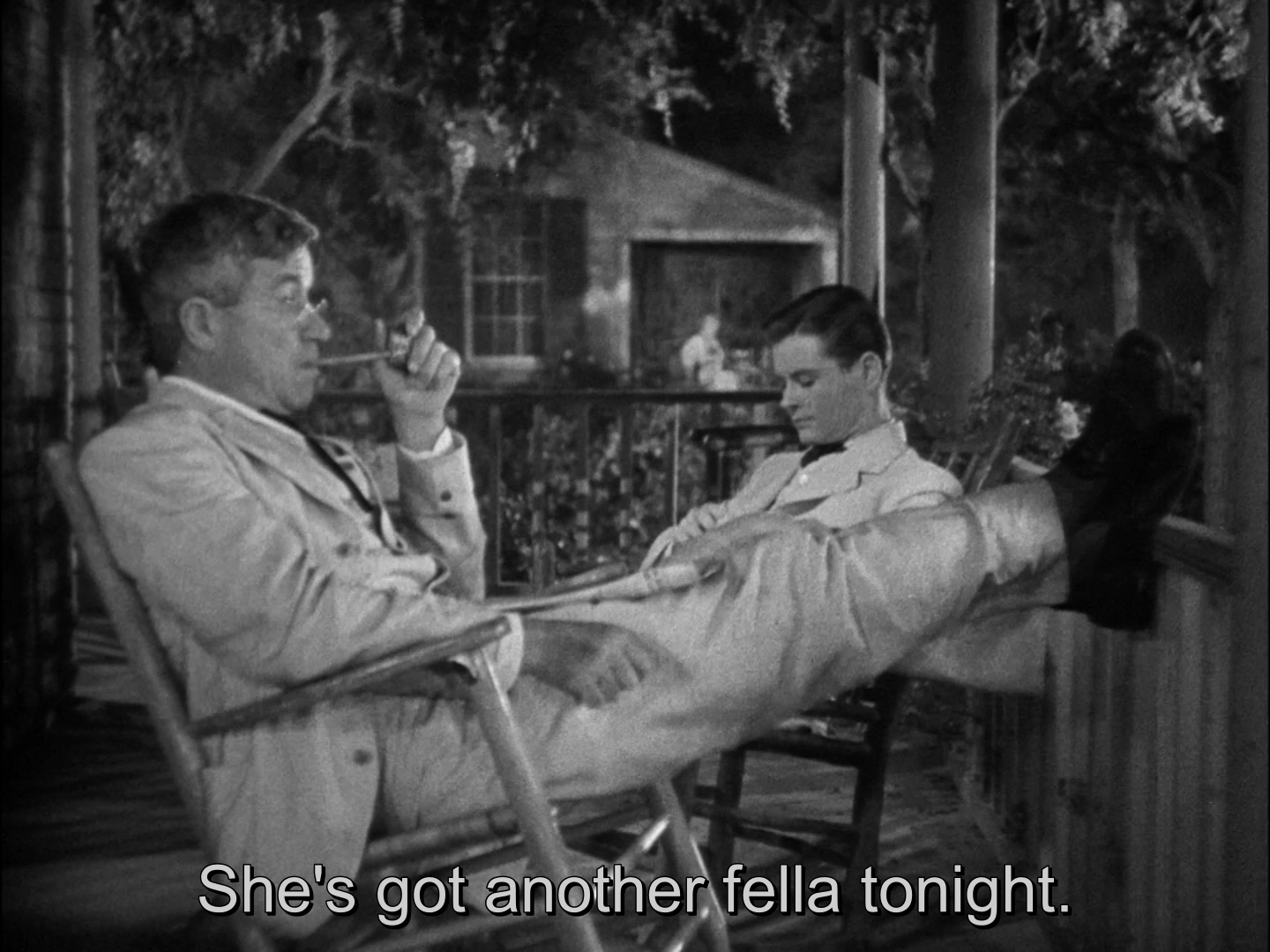
A glance connects Rome and Ellie May, while Priest stays barred off from both.
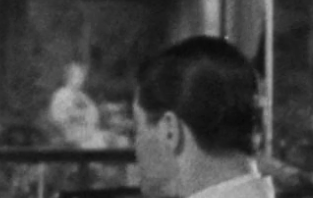
Priest’s view of Rome and Ellie’s relationship is fully revealed whenever he is shown looking at them through the window. He sees him and his wife as ghostly figures, dancing. He then starts a conversation with his dead wife’s portrait. This is Judge Priest’s torment. He is left only with dead ghosts. This is why he takes control and fights so hard for Rome and Ellie’s relationship (in which he sees himself and his wife).
However, it is revealed that Priest does have a companion to ease his loneliness, that being Jeff. In one scene Priest laments his loneliness. He hears the whip-poor-will and mentions having poor company. During all this Jeff is sitting right there, below him. Judge Priest has companionship with Jeff but his intolerance blinds him. He doesn’t see Jeff as a Man, on equal terms with himself, but as lesser. His tolerance is once again shown for what it really is, a charade.
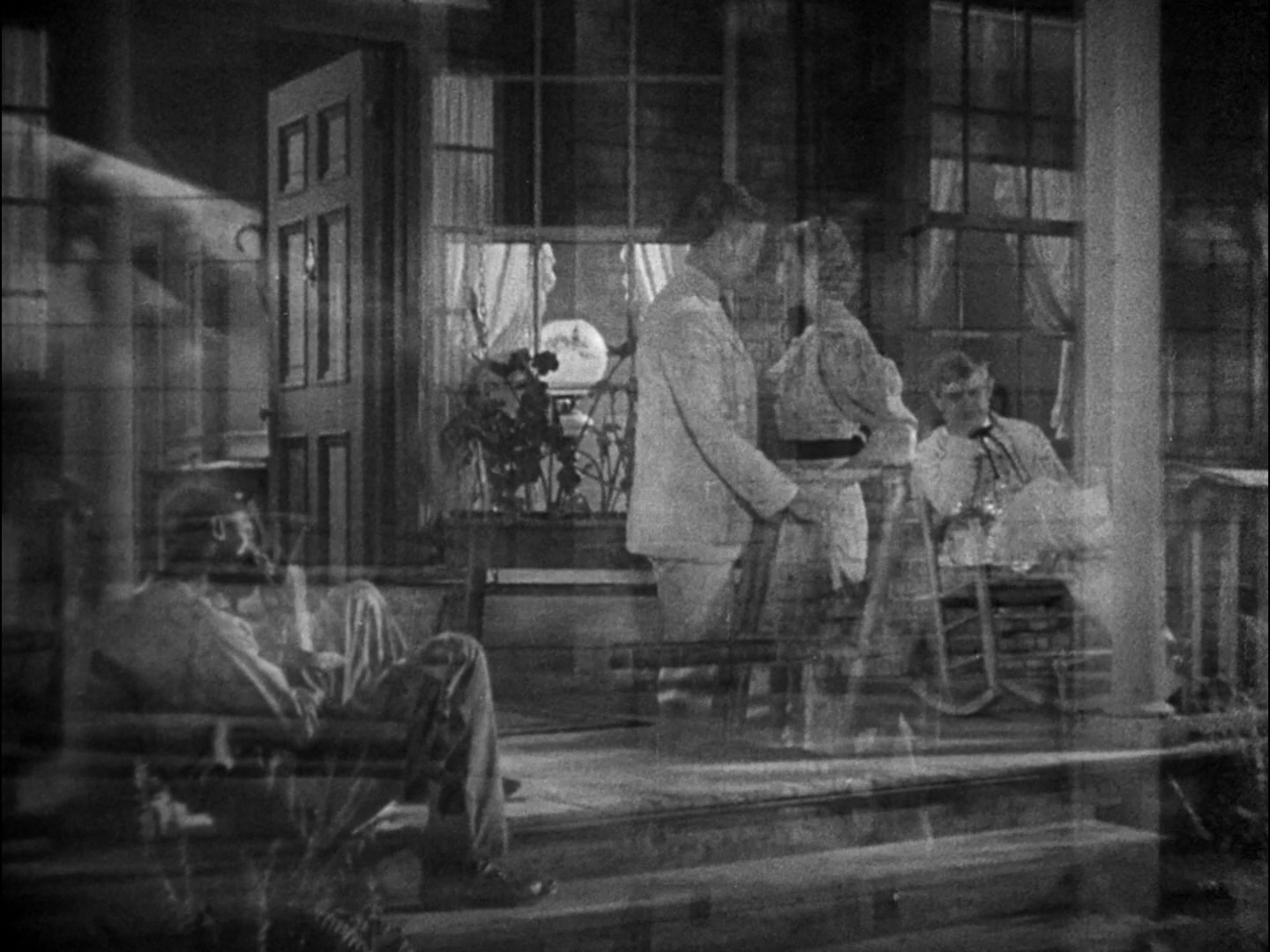
While at his wife’s grave, Priest catches sight of Bob Gillis, who is also at a grave. Locked in his own world of the dead (situated in between the grave and nature, the arch of the tree confining him), he identifies with Gillis. This forms the foundation for Priest’s view of Gillis’ moral character, and this is why Priest ultimately fights to reunite Gillis’ family. By bringing together Gillis and Ellie May; and bringing together Ellie May and Rome, he is reconstructing his own family through the people in which he sees himself. Which is the ultimate purpose of the final trial.
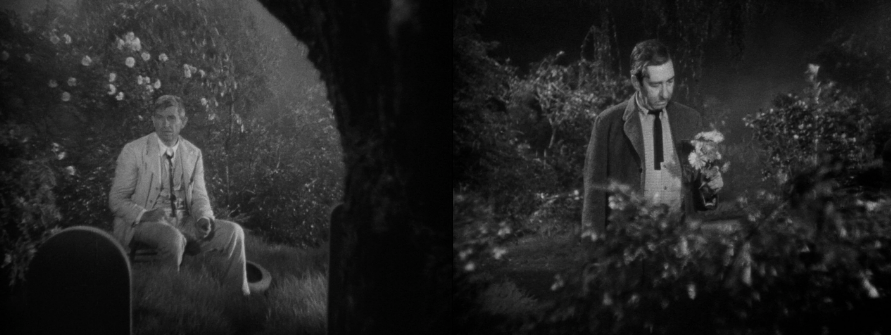
However, during the start of the trial Hod Maydew proposes the removal of Judge Priest from his position of power. In response, Priest exploits the court's adherence to tradition and briefly recounts war memories—to build his own character in the court’s eyes—as he walks away. Judge Priest may briefly lose his powerful position as judge for the trial; however, he still decides the outcome of the case. A later scene shows Priest planning with Reverend Ashby on how Gillis can win the case. In Priest’s nastiest moment of intolerance he tells Jeff (after he asks him to play Dixie outside the window during the court case, and Jeff mentions he can play Marchin Through Georgia as well), “I already got you out of one lynching. If you play ‘Marchin Through Georgia, I’ll join the lynchers!” Priest’s intolerance is fully revealed. The court case comes to a close by Reverend Ashby detailing Gillis’ character during the war, and with Jeff playing Dixie outside. This manipulates the entire court by using their honor for the confederacy.. Gillis wins the case, and he is revealed to be Ellie May’s father. Caroline accepts Ellie May and Rome now that Ellie’s familial pride is restored. Judge Priest reunites the family, but at what cost? The film ultimately ends in a parade. A long line of men decorated in uniforms. Marching as slaves to confederate ideals, slaves to tradition.
Judge Priest is the second of three films that actor Will Rogers made with Ford. Although the films have no narrative connection, together they form a complicated view of America. Doctor Bull (1933) dealing with small town hypocrisy, Judge Priest with the instability of leadership and the confederate myth, and finally in Steamboat Round’ The Bend (1935), Ford posits that in order for progress to be made, the old harmful myths must be destroyed entirely. Cinema as a plea for tolerance.